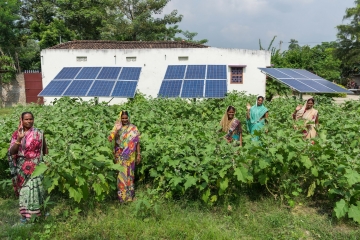Ensuring tangible food security, agricultural development and sustainable resource management has been at the centre of the Aga Khan Foundation (AKF)’s activities since it began. Agriculture remains the single largest employer in the world, providing livelihoods for 40 percent of today’s global population. The world’s 500 million small farms worldwide provide up to 80 percent of the food consumed.
However, 800 million people worldwide still lack regular access to adequate amounts of food. Adding to the traditional challenges is a changing climate that is impacting many farmers: global emissions of carbon dioxide have increased by almost 50 percent since 1990; and Himalayan snow and ice are expected to decline 20 percent by 2030.
In organising AKF’s activities in the following categories, AKF aims to enhance food security, increase sustainable utilisation of natural resources, improve livelihoods from agriculture, and improve resilience towards climate change. Of particular importance is the role of women; it is estimated that the elimination of the gender gap would lower the number of undernourished people in the world by 150 million.
Programme highlights 1: AKF’s farm livelihoods and natural resources management interventions directly benefit over 500,000 people worldwide.
Programme highlights 2: AKF’s innovative approaches to local nutrition and food security benefit over 100,000 people in highly vulnerable communities.
Farm livelihoods: AKF supports farmers and farming communities by promoting high value crops and livestock products. This includes technical assistance on machinery, tools and equipment, sustainable farming techniques and systems of equitable resource management, farm economies and markets. AKF also focuses on organic agriculture, food safety and nutritious foods, food storage and processing to reduce post-harvest losses and farmer groups structured around financial literacy and savings.
Natural resources management: AKF seeks to build a more resilient natural environment in the communities it serves. This includes building the available biomass such as greening areas, and helping communities better manage biodiversity of soils, water, flora including crops and fauna including livestock.
Food security and nutrition: AKF supports the local production of high quality foods and biofortification through local and national stakeholders. AKF also supports agriculture extension workers to promote household autonomy, self-reliance and use of the most nutritious foods. AKF works alongside AKDN agencies and others to improve food security through agricultural interventions as well as complementary actions in health and education supporting targeted household-level nutrition and education on healthy diets, food preparation and food storage.
Programme highlights 1: AKF’s transport infrastructure interventions benefit over 26,000 people in remote areas of Afghanistan.
Programme highlights 2: AKF’s improved water management interventions benefit 120,000 people in India.
Transportation infrastructure: AKF supports communities establish farm-to-market roads and bridges, cross-border bridges and road linkages to existing transportation links. AKF brings together communities, mobilises funding, and ensures quality control and management while communities provide labour and materials.
Irrigation infrastructure: AKF supports communities in developing irrigation systems that improve agricultural productivity and contribute to the development of new lands including solar-powered irrigation and precision irrigation. AKF also mobilises and supports the water management committees to supervise the use and maintenance of the infrastructure.
Storage infrastructure: AKF supports the development and improvement of storage infrastructure for commodities in order to prevent losses and to allow farmers to utilise or sell these commodities when it is more convenient or profitable.
Programme highlights 1: AKF reaches over 112,000 individual farmers and over 3,000 farmer groups with climate-smart interventions worldwide.
Programme highlights 2: AKF’s climate change resilience interventions in mountainous geographies benefit 20,000 people.
Tracking environmental change: In partnership with the University of Central Asia’s Mountain Societies Research Institute, AKF analyses changes occurring in the environment and in agriculture across various Central Asian mountainous environments in order to identify suitable ways to adapt in a contextual manner. This includes the use of satellite imagery and unmanned aerial vehicles.
Climate-smart Innovations: In various contexts, AKF supports communities in adapting farming systems to climate change, with a focus on sustainable techniques and locally produced inputs, such as training farmers to select and produce their own seeds, natural fertilizers and pesticides. This includes identifying, developing and scaling innovations, such as zero till tools, drip irrigation and solar pumps and soil moisture retention equipment, for soil and water management.










